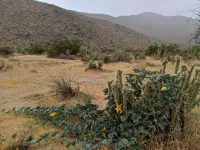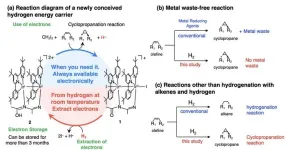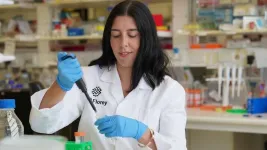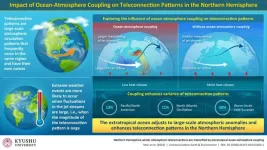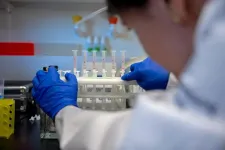(Press-News.org) Just as many people battle seasonal colds and flu, native plants face their own viral threats. People have long known that plants can succumb to viruses just like humans. Now, a new study led by Michigan State University and the University of California, Riverside reveals a previously unknown threat: non-native crop viruses are infecting and jeopardizing the health of wild desert plants.
“For years, the ecological field assumed wild plants were immune to invasive viruses that damage crops,” said Carolyn Malmstrom, a professor of plant biology and ecology, evolution and behavior at MSU and a co-leader of the study. Kerry Mauck, an associate professor and Alfred M. Boyce Endowed Chair in Entomology, was the team leader at UC Riverside and adviser for the lead author Tessa Shates, who was a graduate student in the Mauck Lab.
“But we’ve found that we need to be just as concerned about protecting indigenous plants as we are agricultural ones,” Malmstrom said.
Published in the Phytobiomes Journal, this discovery holds significant implications for conservation efforts. The research utilizes advanced genetic sequencing and field experiments to demonstrate how insects, acting as unwitting infectors, ferry harmful pathogens from cultivated fields to native ecosystems.
The study focused on desert regions of Southern California, where the Cucurbita species of wild squash thrived alongside irrigated agriculture. The team meticulously identified, marked and collected samples from the wild plants.
Then, analyzing the genetic makeup of viruses within these wild plants, the researchers discovered a surprising presence of crop pathogens like cucurbit yellow stunting disorder virus and cucurbit aphid-borne yellows virus, or CABYV.
In fact, they found that infection rates with CABYV — a non-native pathogen — could reach as high as 88% in some wild Cucurbita populations, with visible impacts on plant growth and root health, both vital for the plants survival in the harsh desert environment.
“These wild plants are crucial components of desert ecosystems, providing food and habitat for other species,” Malmstrom said. “Their decline from crop virus infections could have cascading effects on entire ecological communities.”
“Our findings should help the greater community recognize that our impact on the landscapes around us are not always obvious or clear to see,” Shates said. “It’s easy to see the landscape changes of a clear-cut forest, but it is harder to recognize how hitchhiking microbes might change plant community structure over time.”
Plant virology and research at MSU
Collaboration across the country and fields of research was an important facilitator of this research. Having leading experts in plant biology and entomology contributed to the scientific success of the project, as well as the growth of its early-career researchers.
“In addition to her own contributions, Dr. Malmstrom has been a great mentor throughout this study,” said Shates, who is now an infectious disease scientist with the research company Quest Diagnostics.
“Doing this research, especially during the pandemic, required learning new skills and expanding my research toolkit,” Shates said. “Dr. Malmstrom was a great resource for recommending technical methods to try for data analysis and generating ‘genomes’ for the viruses in our samples.”
As an AgBioResearch scientist, Malmstrom was also able to tap into both agricultural and natural systems expertise at MSU.
“This project bridges the gap between agriculture and natural systems, reminding us that nature and agriculture are intricately linked,” said Malmstrom. “It also underscores the need for a more holistic approach to managing plant health and shows that understanding the complex dynamics of viruses in natural systems is essential for developing sustainable solutions that benefit both agriculture and biodiversity.”
END
Wild plants face viral surprise
MSU, UC Riverside study reveals infections from crops
2024-03-28
ELSE PRESS RELEASES FROM THIS DATE:
Storing electrons from hydrogen for clean chemical reactions
2024-03-28
Fukuoka, Japan—Researchers from Kyushu University have developed a hydrogen energy carrier to address some of the biggest hurdles in the path towards a sustainable hydrogen economy. As explained in a paper published in JACS Au, this novel compound can efficiently “store electrons” from hydrogen in a solid state to use in chemical reactions later.
Hydrogen is a promising source of clean energy with a lot of untapped potential applications in industry and everyday life. Unlike conventional fuels, hydrogen can be used to generate electricity without producing greenhouse ...
Unlocking how to use mRNA to target Alzheimer’s disease
2024-03-28
Scientists at The Florey have developed an mRNA technology approach to target the toxic protein tau, which builds up in patients with Alzheimer’s disease and other dementias.
To date, mRNA has been predominantly used for vaccines, including those used to fight COVID-19.
New research published today in Brain Communications establishes The Florey as a key player in the mRNA field, with Dr Rebecca Nisbet taking the technology in a new direction.
“This is the first time mRNA has been explored for use in Alzheimer’s disease,” Dr Nisbet said. “Our work in cell models demonstrates that this technology ...
Kessler Foundation secures $770,000 in grants to advance leading-edge spinal cord research
2024-03-28
East Hanover, NJ – March 28, 2024 – Kessler Foundation received two grants from The New Jersey Commission on Spinal Cord Research that will fuel innovative research in the field of spinal cord injury (SCI). These grants will fund efforts aimed at improving the cognitive assessment of individuals with traumatic SCI and pilot-testing the first-of-its-kind Spinal Cord Injury Personal Assistance Services Survey (SCI-PASS).
Traumatic spinal cord injury (tSCI) often leads to cognitive impairment, affecting up to 60 percent of individuals living with this condition. “The challenge lies in assessing cognitive functions in people with tSCI, as many existing tests rely on upper limb ...
Going ‘back to the future’ to forecast the fate of a dead Florida coral reef
2024-03-28
Rising temperatures and disease outbreaks are decimating coral reefs throughout the tropics. Evidence suggests that higher latitude marine environments may provide crucial refuges for many at-risk, temperature-sensitive coral species. However, how coral populations expand into new areas and sustain themselves over time is constrained by the limited scope of modern observations.
What can thousands of years of history tell us about what lies ahead for coral reef communities? A lot. In a new study, Florida Atlantic University researchers and collaborators provide geological insights into coral range expansions by reconstructing the composition of a Late Holocene-aged subfossil coral ...
How extratropical ocean-atmosphere interactions can contribute to the variability of jet streams in the Northern Hemisphere
2024-03-28
Fukuoka, Japan—The interaction between the oceans and the atmosphere plays a vital role in shaping the Earth’s climate. Changing sea surface temperatures can heat or cool the atmosphere, and changes in the atmosphere can do the same to the ocean surface. This exchange in energy is known as “ocean-atmosphere coupling.”
Now, researchers from Kyushu University have revealed that this ocean-atmosphere coupling enhances teleconnection patterns—when climate conditions change across vast regions of the globe—in the Northern Hemisphere. In their recent ...
MSK Research Highlights, March 28, 2024
2024-03-28
Low recurrence seen with cryoablation for large breast tumors
Cryoablation, a minimally invasive technique used to freeze and destroy small tumors, is effective for breast cancer patients with larger tumors, according to research presented by MSK interventional radiologist Yolanda Bryce, MD, at the 2024 Society of Interventional Radiology Annual Scientific Meeting.
The retrospective study assessed outcomes for 60 patients who underwent cryoablation because they were not candidates for surgery or declined surgery due to other health concerns. The average size of their tumors was 2.5 centimeters. In a follow-up after 16 months, only 10% of patients experienced a recurrence ...
USDA, Nueta Hidatsa Sahnish College collaborate to support Indigenous Seed Sovereignty
2024-03-28
MANDAN, N.D., March 28, 2024—The U.S. Department of Agriculture (USDA) Agricultural Research Service (ARS) announces a cooperative agreement with the Nueta Hidatsa Sahnish (NHS) College to conduct research supporting Indigenous Seed Sovereignty. This collaborative effort will increase the number of traditional varieties of seeds of the Mandan, Hidatsa, and Arikara (MHA) Nation crops within NHS College's traditional seed cache.
This agreement builds upon USDA’s strengthened partnerships with ...
For younger women, mental health now may predict heart health later
2024-03-28
Younger women are generally thought to have a low risk of heart disease, but new research urges clinicians to revisit that assumption, especially for women who suffer from certain mental health conditions. A new study being presented at the American College of Cardiology’s Annual Scientific Session found that having anxiety or depression could accelerate the development of cardiovascular risk factors among young and middle-aged women.
The study draws new attention to the importance of cardiovascular screening and preventive care as rates of cardiovascular risk factors rise and heart attacks become more common in younger people. Anxiety and depression ...
Missed opportunity: AEDs near cardiac arrests rarely used by bystanders
2024-03-28
Automated external defibrillators (AEDs) are a common resource in public buildings, yet a new analysis reveals that they are rarely used to help resuscitate people suffering cardiac arrest. Research, which will be presented at the American College of Cardiology’s Annual Scientific Session, found that AEDs were only used in 13 of nearly 1,800 cases of out-of-hospital cardiac arrest, even though many of the incidents occurred near a public AED.
Cardiac arrest occurs when the heart suddenly stops beating. It is different from a heart attack, which is when a blockage prevents blood ...
Eggs may not be bad for your heart after all
2024-03-28
Whether you like your eggs sunny-side up, hard boiled or scrambled, many hesitate to eat them amid concerns that eggs may raise cholesterol levels and be bad for heart health. However, results from a prospective, controlled trial presented at the American College of Cardiology’s Annual Scientific Session show that over a four-month period cholesterol levels were similar among people who ate fortified eggs most days of the week compared with those who didn’t eat eggs.
A total of 140 patients with or at high risk for cardiovascular disease were enrolled in ...
LAST 30 PRESS RELEASES:
Science reveals why you can’t resist a snack – even when you’re full
Kidney cancer study finds belzutifan plus pembrolizumab post-surgery helps patients at high risk for relapse stay cancer-free longer
Alkali cation effects in electrochemical carbon dioxide reduction
Test platforms for charging wireless cars now fit on a bench
$3 million NIH grant funds national study of Medicare Advantage’s benefit expansion into social supports
Amplified Sciences achieves CAP accreditation for cutting-edge diagnostic lab
Fred Hutch announces 12 recipients of the annual Harold M. Weintraub Graduate Student Award
Native forest litter helps rebuild soil life in post-mining landscapes
Mountain soils in arid regions may emit more greenhouse gas as climate shifts, new study finds
Pairing biochar with other soil amendments could unlock stronger gains in soil health
Why do we get a skip in our step when we’re happy? Thank dopamine
UC Irvine scientists uncover cellular mechanism behind muscle repair
Platform to map living brain noninvasively takes next big step
Stress-testing the Cascadia Subduction Zone reveals variability that could impact how earthquakes spread
We may be underestimating the true carbon cost of northern wildfires
Blood test predicts which bladder cancer patients may safely skip surgery
Kennesaw State's Vijay Anand honored as National Academy of Inventors Senior Member
Recovery from whaling reveals the role of age in Humpback reproduction
Can the canny tick help prevent disease like MS and cancer?
Newcomer children show lower rates of emergency department use for non‑urgent conditions, study finds
Cognitive and neuropsychiatric function in former American football players
From trash to climate tech: rubber gloves find new life as carbon capturers materials
A step towards needed treatments for hantaviruses in new molecular map
Boys are more motivated, while girls are more compassionate?
Study identifies opposing roles for IL6 and IL6R in long-term mortality
AI accurately spots medical disorder from privacy-conscious hand images
Transient Pauli blocking for broadband ultrafast optical switching
Political polarization can spur CO2 emissions, stymie climate action
Researchers develop new strategy for improving inverted perovskite solar cells
Yes! The role of YAP and CTGF as potential therapeutic targets for preventing severe liver disease
[Press-News.org] Wild plants face viral surpriseMSU, UC Riverside study reveals infections from crops
